The metal oxide film fixed resistor market is set to grow from USD 837.4 million in 2025 to USD 1,458 million by 2035, reflecting a CAGR of 6%. Compound absolute growth analysis highlights the total incremental revenue generated over the forecast period and provides insight into the combined effects of consistent market expansion and compounding annual growth. From 2025 to 2030, the market is expected to add approximately USD 276 million, supported by increasing demand from electronics, automotive, and industrial equipment sectors. Growth during this period is driven by the adoption of energy-efficient and high-precision components, along with replacement of legacy resistors in modern electronic designs.
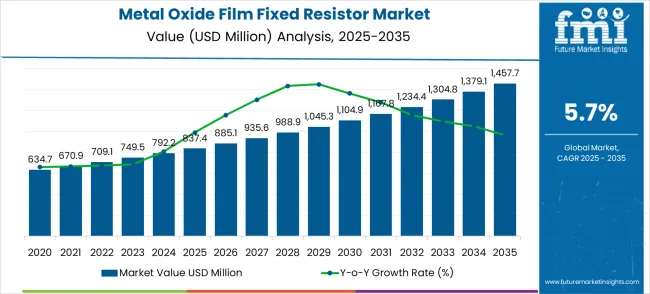
Between 2030 and 2035, compound growth accelerates as the market adds an additional USD 344 million in value, reflecting broader adoption across emerging markets and the integration of resistors into new applications such as smart devices, renewable energy systems, and advanced industrial controls. Technological advancements, including enhanced thermal stability and durability, contribute to higher adoption rates during this phase. The compound absolute growth perspective underscores the cumulative impact of steady adoption, technological improvements, and market expansion, providing stakeholders with a clear view of revenue potential across early and later stages of the decade.
The metal oxide film fixed resistor market is divided into consumer electronics (38%), automotive electronics (27%), industrial and manufacturing equipment (16%), renewable energy and power systems (11%), and specialty electronics such as aerospace, defense, and medical devices (8%). Consumer electronics lead adoption due to high demand for reliable, heat-resistant components in smartphones, laptops, and home appliances. Automotive electronics use metal oxide resistors in engine management, infotainment systems, and electric vehicle components. Industrial applications rely on their stability under high temperatures and harsh conditions. Renewable energy and power systems implement them in inverters, converters, and power regulation circuits. Specialty electronics benefit from precise tolerance, reliability, and durability in safety-critical applications.
Collaborations between resistor producers and end-use industries enable customized solutions for energy efficiency, thermal stability, and long-term reliability, fueling steady global market growth. Recent trends include enhanced power handling, miniaturization, and higher precision resistors. Manufacturers are innovating with low-temperature coefficient materials, corrosion-resistant coatings, and high-reliability designs. Expansion is supported by growth in electric vehicles, industrial automation, and IoT-enabled electronics.
| Metric | Value |
|---|---|
| Estimated Value in (2025E) | USD 837.4 million |
| Forecast Value in (2035F) | USD 1,458 million |
| Forecast CAGR (2025 to 2035) | 6% |
Market expansion is being supported by the increasing demand for electronic devices requiring precise resistance values and stable performance across varying operating conditions. Modern electronic systems require resistors that can withstand high temperatures, provide consistent resistance values, and maintain reliability over extended operating periods. Metal oxide film resistors provide superior temperature stability and power handling capabilities compared to carbon film alternatives, making them essential components in telecommunications equipment, automotive electronics, and medical devices.
The growing focus on power efficiency and circuit miniaturization is driving demand for resistors that can deliver high performance in compact packages. Electronic manufacturers require components that support energy-efficient designs while maintaining operational reliability across diverse applications. The expanding telecommunications infrastructure and increasing adoption of electric vehicles are creating substantial demand for resistors capable of supporting high-power applications and harsh operating environments across global markets.
The market is segmented by product type, application, and region. By product type, the market is divided into rated power, 2W, 3W, 4W, and others. By application, the market is categorized into telecommunication, medical equipment, and others. Regionally, the market is divided into North America, Europe, East Asia, South Asia & Pacific, Latin America, and Middle East & Africa.
The 2W rated power metal oxide film fixed resistor segment is projected to dominate the global market, accounting for 55% of total demand in 2025. This segment benefits from widespread adoption in low- to medium-power electronic circuits, where reliability, thermal stability, and durability are critical factors. These resistors offer excellent performance under fluctuating electrical loads, ensuring effective circuit protection in consumer electronics, industrial machinery, and precision instrumentation. The 2W variants are favored for their compact size, energy efficiency, and ability to maintain stable resistance over prolonged periods, supporting consistent operational performance. Advancements in material composition and manufacturing processes have further enhanced thermal endurance, noise suppression, and voltage tolerance, driving continued preference among circuit designers and manufacturers.
Growth is further supported by the rapid expansion of electronics manufacturing in the Asia-Pacific region, alongside increasing industrial automation, which demands robust and reliable components for control and monitoring systems. The segment’s resilience in diverse applications makes it a key contributor to market revenue.
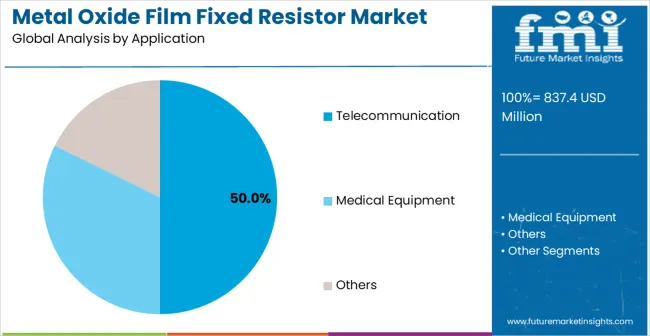
Telecommunication applications are expected to capture around 50% of the global metal oxide film fixed resistor market in 2025, driven by rapid expansion of communication networks and growing demand for high-speed data transmission. These resistors are extensively used in network routers, amplifiers, signal processing units, and base station equipment due to their high precision, stability, and ability to handle continuous electrical loads without degradation.
The segment benefits significantly from large-scale investments in 5G infrastructure, fiber optic networks, and data center expansions, which require components capable of maintaining high-frequency signal integrity while minimizing energy loss. Furthermore, metal oxide film resistors ensure efficient power management and long-term operational reliability in telecommunication systems, contributing to reduced downtime and maintenance costs. The increasing modernization of telecom networks in developed economies, coupled with network expansions in emerging regions, continues to drive steady demand for high-quality resistors in this segment.
The metal oxide film fixed resistor market is advancing steadily due to increasing electronic device manufacturing and growing demand for reliable power management components across diverse applications. The market faces challenges including raw material price volatility affecting production costs, competition from alternative resistor technologies including thick film and wire-wound designs, and technical complexity in meeting increasingly stringent performance requirements. Innovation in manufacturing processes and material formulations continues to influence product development and market competitiveness while addressing evolving customer specifications.
Market growth is driven by expanding telecommunications infrastructure requiring high-reliability components for network equipment and communication systems, increasing automotive electronics adoption creating demand for resistors capable of operating in harsh environmental conditions, and growing industrial automation applications requiring precise control system components. Medical equipment manufacturing drives demand for resistors meeting stringent reliability and safety standards while supporting advanced diagnostic and therapeutic device functions. Consumer electronics expansion creates volume demand for cost-effective resistors supporting diverse circuit applications across portable devices and home appliances. Energy-efficient system development promotes adoption of resistors that minimize power loss while maintaining circuit performance and regulatory compliance.
Market restraints include raw material cost fluctuations affecting production economics and pricing stability, manufacturing complexity requiring specialized equipment and quality control processes that limit production scalability, and technical challenges in meeting increasingly stringent environmental and performance specifications. Competition from alternative resistor technologies may reduce market share in specific applications where alternative designs provide superior characteristics or cost advantages. Supply chain disruptions can affect component availability while creating price volatility that impacts customer procurement decisions. Regulatory compliance requirements create additional costs while demanding continuous product development to meet evolving safety and environmental standards across different geographic markets.
Key trends include development of high-temperature resistors supporting automotive under-hood applications and industrial process control systems, integration of automated manufacturing processes improving production consistency while reducing costs, and advancement in metal oxide film formulations enabling enhanced performance characteristics including improved temperature stability and power handling capacity. Miniaturization continues driving demand for compact resistor packages that support high-density circuit designs without compromising electrical performance. Environmental compliance initiatives promote development of lead-free and RoHS-compliant resistors meeting global regulatory requirements. Quality improvement programs focus on reducing tolerance variations and enhancing long-term reliability characteristics that support critical system applications requiring extended operational lifecycles.
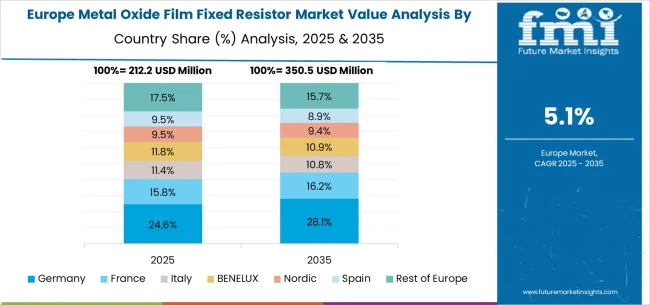
The metal oxide film fixed resistor market in Europe demonstrates mature development across major industrial economies with Germany showing strong presence through its automotive electronics industry and precision manufacturing capabilities that drive demand for high-quality resistors supporting advanced vehicle systems and industrial equipment. The country benefits from established electronic component suppliers and research institutions that advance resistor technology development and manufacturing processes. France represents a significant market driven by telecommunications infrastructure and aerospace applications requiring specialized resistors capable of operating in demanding environmental conditions. The UK exhibits considerable growth through its focus on automotive electronics development and medical device manufacturing that require high-reliability resistor components.
Italy and Spain show expanding applications in industrial automation and renewable energy systems, with growing adoption of metal oxide film resistors for power management and control applications. Nordic countries contribute through their focus on telecommunications equipment and environmental monitoring systems requiring precise resistor components. BENELUX region displays consistent growth supported by electronic device manufacturing and logistics infrastructure serving European markets. Eastern European countries demonstrate increasing adoption driven by manufacturing expansion and growing electronics industry development across automotive and industrial sectors.
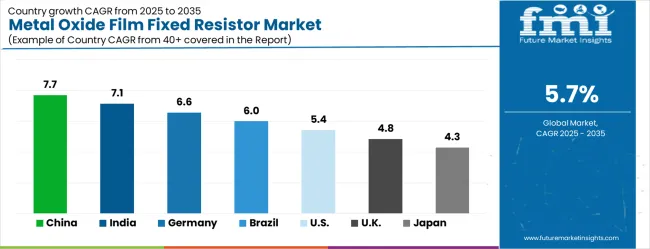
| Country | CAGR (2025-2035) |
|---|---|
| China | 7.7% |
| India | 7.1% |
| Germany | 6.6% |
| Brazil | 6.0% |
| United States | 5.4% |
| United Kingdom | 4.8% |
| Japan | 4.3% |
The metal oxide film fixed resistor market is experiencing steady growth globally, with China leading at a 7.7% CAGR through 2035, driven by massive electronics manufacturing capacity and domestic demand for electronic components. India follows at 7.1%, supported by expanding telecommunications infrastructure and growing electronics manufacturing industry. Germany shows solid growth at 6.6%, prioritizing automotive electronics and industrial automation applications. Brazil records 6.0% growth, driven by telecommunications modernization and industrial development programs. The United States maintains 5.4% growth, focusing on advanced electronic systems and telecommunications equipment. The UK and Japan show steady development at 4.8% and 4.3% respectively, prioritizing specialized applications and technology advancement.
The report covers an in-depth analysis of 40+ countries, Top-performing countries are highlighted below.
China is projected to dominate the global metal oxide film fixed resistor market with a CAGR of 7.7% through 2035, fueled by the rapid expansion of electronics manufacturing and domestic demand for electronic components. Major cities like Shenzhen, Shanghai, and Beijing serve as hubs for consumer electronics, telecommunications, and automotive electronics production, generating strong demand for resistors with high reliability, thermal stability, and voltage tolerance. Government programs supporting 5G infrastructure deployment and electric vehicle development further drive the need for advanced resistors in network equipment and automotive electronics. Domestic manufacturers are scaling production to meet both local consumption and international export demand, leveraging cost-effective manufacturing processes and research and development investments in material composition, thermal endurance, and noise reduction. Continuous innovation in resistor design enables China to maintain leadership in electronics manufacturing while satisfying increasingly complex requirements from industrial automation, telecommunication systems, and consumer device applications.
The metal oxide film fixed resistor market in India is growing at a projected CAGR of 7.1% through 2035, driven by the expansion of telecommunications networks and the electronics manufacturing industry in metropolitan centers including Mumbai, Delhi, and Bangalore. The country’s growing digital communication infrastructure, including 5G adoption and fiber optic networks, creates demand for high-precision resistors used in routers, amplifiers, and signal processing systems. Government initiatives promoting electronics manufacturing under the Make in India program encourage domestic production of resistors and facilitate technology transfer from international manufacturers. Private electronics companies are investing in production facilities to leverage skilled labor, lower manufacturing costs, and supply the growing local demand. Rising adoption of consumer electronics, industrial automation, and network infrastructure creates sustained opportunities for high-reliability resistors, with continued focus on precision, durability, and thermal stability. India’s market growth is strengthened by both domestic component production and partnerships with global suppliers to meet complex application requirements.
The metal oxide film fixed resistor market in Germany is projected to grow at a CAGR of 6.6% through 2035, driven by the country’s leadership in automotive electronics and industrial automation technologies. Automotive manufacturers in Munich, Stuttgart, and Wolfsburg extensively use resistors for engine management systems, electric vehicle powertrains, autonomous driving modules, and advanced safety systems. These applications demand resistors with superior thermal stability, environmental resilience, and high reliability. Industrial automation sectors require precise resistors for control systems, sensor circuits, and power management applications that support Industry 4.0 initiatives. German manufacturers leverage advanced production capabilities and rigorous quality standards to produce high-performance resistors that meet stringent automotive and industrial certifications. Export opportunities further strengthen the market as German-made resistors are supplied globally for high-precision applications. Continuous research and development enhances resistor material composition, thermal endurance, and noise reduction, enabling Germany to maintain technology leadership and address evolving electronic system requirements across automotive, industrial, and communication sectors.
The metal oxide film fixed resistor market in Brazil is expected to grow at a CAGR of 6.0% through 2035, propelled by telecommunications infrastructure upgrades and industrial modernization initiatives. Major cities including São Paulo, Rio de Janeiro, and Brasília are experiencing rapid expansion of cellular networks, fiber optic systems, and broadband services, creating strong demand for high-performance resistors in network equipment. Industrial sectors, particularly manufacturing automation and process control, increasingly rely on resistors to maintain precision, reliability, and energy efficiency in electronic control systems. Government investment in infrastructure modernization and technology transfer initiatives encourages domestic production capabilities while supporting procurement of advanced electronic components. Demand is further enhanced by expansion in consumer electronics, smart grids, and industrial electronics applications. High-quality resistors are required to withstand environmental variations and provide stable performance across diverse operational conditions. Brazil’s growing electronics ecosystem, combined with strategic governmental support, positions the market for continued adoption of metal oxide film resistors across telecommunication and industrial applications.
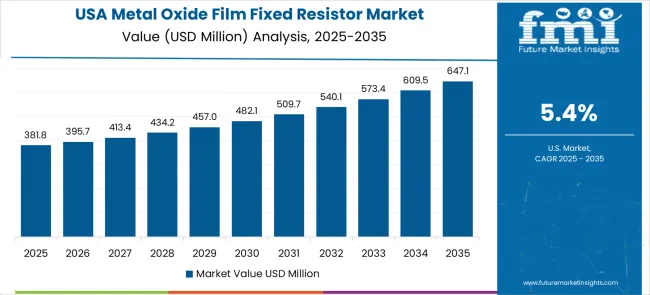
The United States metal oxide film fixed resistor market is projected to grow at a CAGR of 5.4% through 2035, fueled by the country’s advanced electronics industry and focus on technology integration. Resistors are critical components in defense systems, telecommunications equipment, medical devices, and aerospace applications, where reliability and precision directly affect system performance and safety compliance. Large-scale electronics manufacturers and system integrators require high-precision resistors that maintain performance under high-frequency signals, thermal stress, and fluctuating electrical loads. Federal and commercial research initiatives promote technology development through collaboration with component manufacturers, addressing emerging requirements in IoT, smart infrastructure, and digital communication systems. Resistor compatibility with integrated digital platforms, IoT modules, and automated control systems ensures seamless operation and long-term reliability. The market benefits from domestic manufacturing excellence, rigorous quality control standards, and strong R&D investment, enabling USA manufacturers to meet specialized component requirements while maintaining global competitiveness in high-performance electronic systems.
The metal oxide film fixed resistor market in UK is projected to grow at a CAGR of 4.8% through 2035, driven by medical electronics development and telecommunications infrastructure expansion. High-precision resistors are essential for medical diagnostic and therapeutic equipment, where component reliability and regulatory compliance are critical for patient safety. The telecommunications sector demands resistors capable of handling high-frequency signals with minimal signal loss, supporting routers, amplifiers, base stations, and fiber optic networks. UK manufacturers and service providers maintain advanced qualification and testing capabilities to ensure resistors meet application-specific requirements. Government and private sector investment in healthcare technology, digital networks, and industrial automation supports systematic adoption of high-performance resistors. The market prioritizes on long-term reliability, thermal stability, and accuracy across diverse operating conditions. Professional services, including component testing, certification, and design support, ensure that resistors perform consistently in critical applications. These factors collectively sustain growth in the UK’s market for metal oxide film fixed resistors.
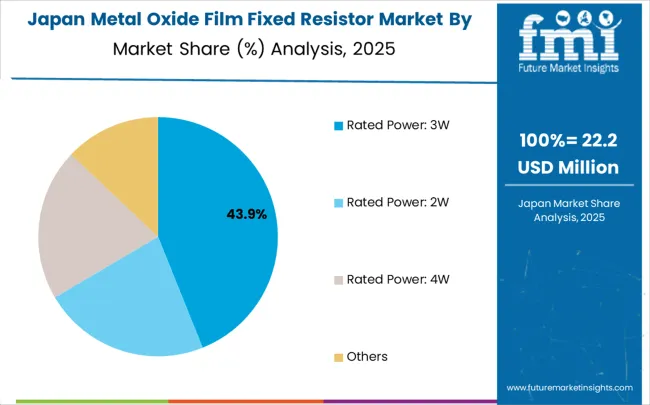
The metal oxide film fixed resistor market in Japan is expanding at a CAGR of 4.3% through 2035, driven by a focus on precision manufacturing, advanced electronics, and stringent quality standards. Automotive electronics, industrial equipment, and consumer devices demand resistors with exceptional accuracy, thermal stability, and reliability to maintain optimal system performance. Japanese manufacturers prioritize high-quality production processes, ensuring consistent performance across each resistor unit, while research and development efforts continuously improve material composition and environmental resilience. The automotive sector, including electric and autonomous vehicles, requires resistors that withstand high temperatures and voltage variations, while industrial automation systems rely on precise resistor components for sensor circuits, process control, and energy management. Telecommunications and consumer electronics applications further reinforce demand for resistors capable of maintaining signal integrity under high-frequency conditions. Japan’s commitment to technological excellence, precision engineering, and quality assurance supports continued adoption of specialized metal oxide film resistors across critical electronic applications.
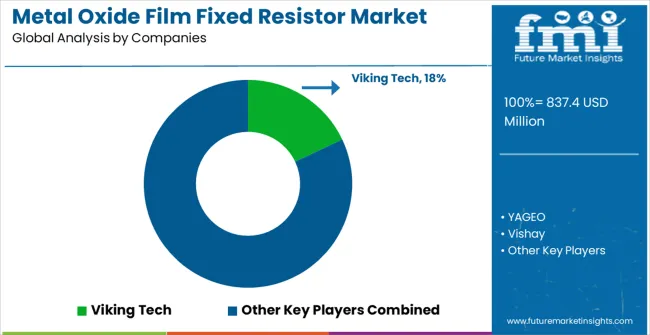
The metal oxide film fixed resistor market is characterized by competition among established electronic component manufacturers, specialized resistor producers, and emerging technology providers. Companies are investing in advanced manufacturing processes, quality control systems, automated production lines, and research and development capabilities to deliver precise, reliable, and cost-effective resistor solutions. Technology innovation, manufacturing efficiency, and customer service excellence are central to strengthening product portfolios and market presence across diverse electronic applications.
Viking Tech, Taiwan-based, maintains competitive position through comprehensive resistor product lines and established relationships with electronics manufacturers across telecommunications and automotive sectors. YAGEO provides extensive component portfolios with focus on volume production and global distribution capabilities serving diverse electronic applications. Vishay, USA, leads technology development with advanced resistor designs and specialized solutions for demanding applications including automotive and industrial electronics. Teikoku Tsushin Kogyo specializes in high-frequency applications and telecommunications equipment supporting network infrastructure development.
Firstohm develops precision resistors for measurement and control applications while KWK provides cost-effective solutions for consumer electronics manufacturing. KLS focuses on automotive-qualified components meeting stringent environmental and reliability requirements. BONENS, YESO, and Max Quality Electric represent emerging manufacturers developing competitive resistor solutions for expanding electronic markets. Guangzhou Xieyuan Electronic Technology and Nanyang Jinniu Electric contribute specialized manufacturing capabilities supporting regional market development and cost-competitive production.
The metal oxide film fixed resistor market represents a foundational electronic components sector valued at USD 837.4 million in 2024, projected to reach USD 1,458 million by 2032 with a 6% CAGR. These precision resistors provide critical voltage regulation and current limiting functions in electronic circuits, offering superior thermal stability and reliability compared to carbon-based alternatives. The market spans multiple power ratings (2W, 3W, 4W, and others) serving telecommunications (USD 310.3 million), medical equipment, and diverse electronic applications across key regions including China (7.7% market share), India (7.1%), Germany (6.6%), and Brazil (6.0%).
How Governments Could Strengthen Electronics Manufacturing and Innovation?
Electronics Manufacturing Incentives: Support domestic resistor manufacturing through production-linked incentive schemes, tax credits, and grants that encourage local component production and reduce dependence on imports for critical electronic components.
Quality Standards and Certification: Establish rigorous testing standards for metal oxide film resistors, particularly for telecommunications and medical applications where component reliability directly impacts system performance and safety.
Research and Development Support: Fund materials science research focused on advanced metal oxide formulations, substrate technologies, and manufacturing processes that improve resistor precision, temperature coefficients, and long-term stability.
Strategic Component Stockpiling: Maintain strategic reserves of critical electronic components including precision resistors for telecommunications infrastructure, medical equipment, and defense applications to ensure supply chain resilience.
Export Promotion Programs: Support domestic resistor manufacturers in accessing global markets through trade missions, certification assistance, and export financing programs that build national competitiveness in electronic components.
How Industry Standards Organizations Could Advance Component Reliability?
Precision and Tolerance Standards: Develop comprehensive specifications for resistance accuracy, temperature coefficients, and aging characteristics across different power ratings and operating environments.
Application-Specific Guidelines: Create detailed standards for resistor selection and implementation in telecommunications equipment, medical devices, and other critical applications where component failure can have significant consequences.
Testing and Qualification Protocols: Establish standardized testing procedures for thermal cycling, humidity resistance, mechanical stress, and electrical stability that ensure consistent component performance across manufacturers.
Supply Chain Quality Assurance: Develop certification programs for resistor manufacturers that verify production processes, quality control systems, and traceability requirements throughout the supply chain.
International Harmonization: Coordinate with global standards organizations to ensure compatibility and interchangeability of metal oxide film resistors across international markets and applications.
How Component Manufacturers Could Enhance Product Performance?
Advanced Material Engineering: Develop improved metal oxide film formulations and substrate materials that provide tighter tolerance control, lower temperature coefficients, and enhanced long-term stability.
Precision Manufacturing Processes: Implement advanced deposition techniques, laser trimming technologies, and automated quality control systems that achieve consistent resistance values and minimize manufacturing variations.
Power Rating Optimization: Engineer resistor designs that maximize power handling capability while minimizing physical size, enabling higher power density in compact electronic assemblies.
Environmental Robustness: Enhance resistance to humidity, temperature cycling, and mechanical stress through improved protective coatings, encapsulation materials, and package designs.
Application-Specific Solutions: Develop specialized resistor variants optimized for specific applications such as high-frequency telecommunications equipment or precision medical instrumentation.
How End-User Industries Could Optimize Component Integration?
Design for Reliability: Implement rigorous component selection processes that consider operating environment, expected lifetime, and failure mode impacts when specifying metal oxide film resistors in critical applications.
Supply Chain Diversification: Maintain multiple qualified suppliers for critical resistor components to ensure production continuity and mitigate supply chain disruption risks.
Performance Monitoring and Analytics: Track resistor performance data across different applications and operating conditions to inform future design decisions and identify optimal component specifications.
Collaborative Development Programs: Partner with resistor manufacturers to develop customized solutions that meet specific performance requirements while optimizing cost and reliability trade-offs.
Inventory Management Optimization: Implement sophisticated inventory management systems that balance component availability with working capital efficiency, particularly for high-volume manufacturing operations.
How Financial Partners Could Support Market Growth?
Manufacturing Equipment Financing: Provide specialized financing for advanced resistor manufacturing equipment, including thin-film deposition systems, laser trimming machines, and automated testing equipment.
Technology Development Investment: Fund research into next-generation resistor technologies, including advanced materials, nanotechnology applications, and smart component integration capabilities.
Working Capital Solutions: Support component manufacturers with working capital financing that accommodates the cyclical nature of electronics demand and long payment cycles from major customers.
Market Expansion Capital: Provide growth capital for resistor manufacturers expanding into new geographic markets or developing specialized products for emerging applications such as electric vehicles or renewable energy systems.
Supply Chain Financing: Offer supply chain financing solutions that help electronics manufacturers manage component inventory costs while ensuring availability of critical resistor components for production continuity.
This framework reflects the foundational role of metal oxide film resistors in modern electronics, where precision, reliability, and cost-effectiveness drive demand across telecommunications, medical equipment, and diverse electronic applications in a globally competitive component marketplace.
| Items | Values |
|---|---|
| Quantitative Units (2025) | USD 837.4 million |
| Product Type | Rated Power: 2W, Rated Power: 3W, Rated Power: 4W, Others |
| Application | Telecommunication, Medical Equipment, Others |
| Regions Covered | North America, Europe, East Asia, South Asia & Pacific, Latin America, Middle East & Africa |
| Countries Covered | United States, Canada, United Kingdom, Germany, France, China, Japan, South Korea, India, Brazil, Australia and 40+ countries |
| Key Companies Profiled | Viking Tech, YAGEO, Vishay, Teikoku Tsushin Kogyo, Firstohm, KWK, KLS, BONENS, YESO, Max Quality Electric, Guangzhou Xieyuan Electronic Technology, Nanyang Jinniu Electric |
| Additional Attributes | Dollar sales by power rating and tolerance levels, regional electronic component demand trends, competitive landscape with established component manufacturers and emerging technology providers, adoption patterns across telecommunications and automotive applications, integration with power management systems and circuit protection applications, innovations in metal oxide film formulations and manufacturing processes, and development of miniaturized resistor packages with enhanced power handling and environmental stability characteristics for diverse electronic system requirements. |
The global metal oxide film fixed resistor market is estimated to be valued at USD 837.4 million in 2025.
The market size for the metal oxide film fixed resistor market is projected to reach USD 1,457.7 million by 2035.
The metal oxide film fixed resistor market is expected to grow at a 5.7% CAGR between 2025 and 2035.
The key product types in metal oxide film fixed resistor market are rated power: 3w, rated power: 2w, rated power: 4w and others.
In terms of application, telecommunication segment to command 50.0% share in the metal oxide film fixed resistor market in 2025.






Our Research Products

The "Full Research Suite" delivers actionable market intel, deep dives on markets or technologies, so clients act faster, cut risk, and unlock growth.

The Leaderboard benchmarks and ranks top vendors, classifying them as Established Leaders, Leading Challengers, or Disruptors & Challengers.

Locates where complements amplify value and substitutes erode it, forecasting net impact by horizon

We deliver granular, decision-grade intel: market sizing, 5-year forecasts, pricing, adoption, usage, revenue, and operational KPIs—plus competitor tracking, regulation, and value chains—across 60 countries broadly.

Spot the shifts before they hit your P&L. We track inflection points, adoption curves, pricing moves, and ecosystem plays to show where demand is heading, why it is changing, and what to do next across high-growth markets and disruptive tech

Real-time reads of user behavior. We track shifting priorities, perceptions of today’s and next-gen services, and provider experience, then pace how fast tech moves from trial to adoption, blending buyer, consumer, and channel inputs with social signals (#WhySwitch, #UX).

Partner with our analyst team to build a custom report designed around your business priorities. From analysing market trends to assessing competitors or crafting bespoke datasets, we tailor insights to your needs.
Supplier Intelligence
Discovery & Profiling
Capacity & Footprint
Performance & Risk
Compliance & Governance
Commercial Readiness
Who Supplies Whom
Scorecards & Shortlists
Playbooks & Docs
Category Intelligence
Definition & Scope
Demand & Use Cases
Cost Drivers
Market Structure
Supply Chain Map
Trade & Policy
Operating Norms
Deliverables
Buyer Intelligence
Account Basics
Spend & Scope
Procurement Model
Vendor Requirements
Terms & Policies
Entry Strategy
Pain Points & Triggers
Outputs
Pricing Analysis
Benchmarks
Trends
Should-Cost
Indexation
Landed Cost
Commercial Terms
Deliverables
Brand Analysis
Positioning & Value Prop
Share & Presence
Customer Evidence
Go-to-Market
Digital & Reputation
Compliance & Trust
KPIs & Gaps
Outputs
Full Research Suite comprises of:
Market outlook & trends analysis
Interviews & case studies
Strategic recommendations
Vendor profiles & capabilities analysis
5-year forecasts
8 regions and 60+ country-level data splits
Market segment data splits
12 months of continuous data updates
DELIVERED AS:
PDF EXCEL ONLINE
Metal Oxide Varistor (MOV) Surge Arresters Market Size and Share Forecast Outlook 2025 to 2035
Metal Film Analog Potentiometers Market Size and Share Forecast Outlook 2025 to 2035
Metallized Film Market from 2025 to 2035
Industry Share Analysis for Nano Metal Oxide Providers
Metal & Metal Oxide Nanoparticles Market Growth – Trends & Forecast 2024-2034
Metalized Barrier Film Market Forecast and Outlook 2025 to 2035
Competitive Landscape of Metalized Barrier Film Packaging Providers
Market Share Insights of Metalized Barrier Film Providers
Metallized Barrier Film Packaging Market by Material Type from 2025 to 2035
Gold Metalized Film Market Trends & Growth Forecast 2024-2034
Metallised Polyester Films Market Size and Share Forecast Outlook 2025 to 2035
Metallized Rollstock Film Market Size, Growth, and Forecast 2025 to 2035
Aluminum Oxide Coated Films Market
Film and TV IP Peripherals Market Size and Share Forecast Outlook 2025 to 2035
Metallurgical Lighting Market Size and Share Forecast Outlook 2025 to 2035
Metal Evaporation Boat Market Size and Share Forecast Outlook 2025 to 2035
Metal Miniature Bone Plates Market Size and Share Forecast Outlook 2025 to 2035
Metal Locking Plate and Screw System Market Size and Share Forecast Outlook 2025 to 2035
Metal Pallet Market Size and Share Forecast Outlook 2025 to 2035
Film Wrapped Wire Market Size and Share Forecast Outlook 2025 to 2035

Thank you!
You will receive an email from our Business Development Manager. Please be sure to check your SPAM/JUNK folder too.
Chat With
MaRIA